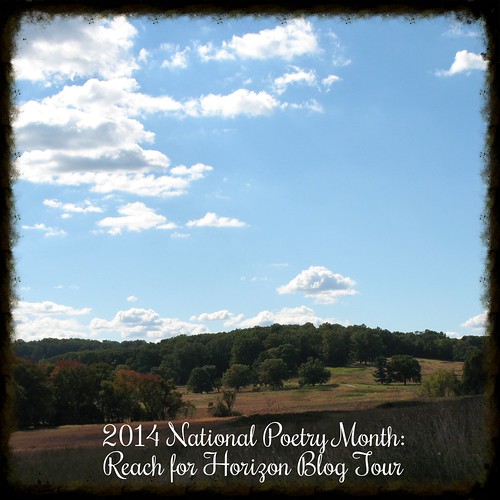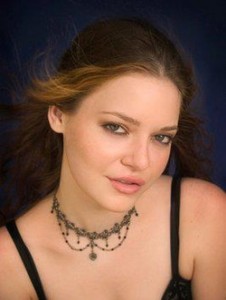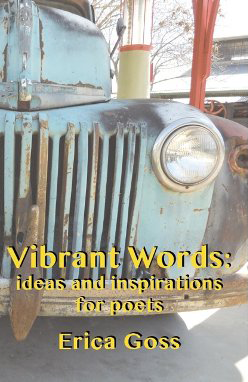
I hope that you’ve all found something new to read for the rest of the year and that it is a new poet or collection. Click the icon at the left to see the whole tour and more!
Thanks to everyone for joining in the blog tour as a poster, blogger, or commenter. I appreciate all of your enthusiasm. See everyone again in 2015.
Without further ado, I bring the National Poetry Month Blog tour to a close with a guest post from Tabatha Yeatts, and a collaborative poem. Please give her a warm welcome.
Poet and author Irene Latham introduced the idea for the Kidlitosphere Progressive Poem in 2012 and it has become an annual National Poetry Month event.
Each day in April, a different kidlitosphere blogger provides the next line in the poem. No plans for themes or rhyme schemes are worked out ahead of time — everyone is just working on the fly. If you’ve never tried to write collaboratively, you might want to give a project like this a go. It’s a very interesting process, both to participate in and to watch unfold.
Here’s this year’s poem:
Three Blue Eggs
Sitting on a rock, airing out my feelings to the universe
Acting like a peacock, only making matters that much worse;
Should I trumpet like an elephant emoting to the moon
Or just ignore the warnings written in the rune?
Those stars can’t seal my future; it’s not inscribed in stone.
The possibilities are endless! Who could have known?
Gathering courage, spiral like an eagle after prey,
Then gird my wings for whirlwind gales in realms far, far away.
But, hold it! Let’s get practical! What’s needed before I go?
Time to be tactical—I’ll ask my friends what I should stow.
And in one breath, a honeyed word whispered low—dreams—
Whose voice? I turned to see. I was shocked. Irene’s!
“Each voyage starts with tattered maps; your dreams dance on this page.
Determine these dreams—then breathe them! Engage your inner sage.”
The merry hen said, “Take my sapphire eggs to charm your host.”
I tuck them close—still warm—then take my first step toward the coast.
This journey will not make me rich, and yet I long to be
Like luminescent jellyfish, awash in mystery.
I turn and whisper, “Won’t you come?” to all the beasts and birds
And listen while they scamper, their answers winging words:
“Take these steps alone to start; each journey is an art.
You are your own best company. Now it’s time to depart!”
I blow a kiss. I hike for days, blue eggs pressed to my chest.
One evening’s rest, campfire low, shifting shadows brought a guest.
A boy, with hair in wild waves and eyes blue as the sea,
Says, “You’ve traveled far. What did you find—your best discovery?”
“I found a bird, I found a song, I found a word,” I say.
The hidden eggs, I make them known. “I’ve brought these on the way.”
We share an omelet and some talk; is my quest at an end?
Check out the last line, here.
1 Charles at Poetry Time
2 Joy at Joy Acey
3 Donna at Mainely Write
4 Anastasia at Poet! Poet!
5 Carrie at Story Patch
6 Sheila at Sheila Renfro
7 Pat at Writer on a Horse
8 Matt at Radio, Rhythm & Rhyme
9 Diane at Random Noodling
10 Tabatha at The Opposite of Indifference
11 Linda at Write Time
12 Mary Lee at A Year of Reading
13 Janet at Live Your Poem
14 Deborah at Show–Not Tell
15 Tamera at The Writer’s Whimsy
16 Robyn at Life on the Deckle Edge
17 Margaret at Reflections on the Teche
18 Irene at Live Your Poem
19 Julie at The Drift Record
20 Buffy at Buffy Silverman
21 Renee at No Water River
22 Laura at Author Amok
23 Amy at The Poem Farm
24 Linda at TeacherDance
25 Michelle at Today’s Little Ditty
26 Lisa at Lisa Schroeder Books
27 Kate at Live Your Poem
28 Caroline at Caroline Starr Rose
29 Ruth at There is No Such Thing as a Godforsaken Town
30 Tara at A Teaching Life
Also, here’s the link to my collection of poems about imaginary places. It also mentions the Summer Poem Swap I’ll be holding. People are welcome to email me with questions about it or with requests to join.
Thanks, Tabatha!





 Erica is truly a driven poet. Thanks so much for sharing your travels and your inspiration with us.
Erica is truly a driven poet. Thanks so much for sharing your travels and your inspiration with us.




